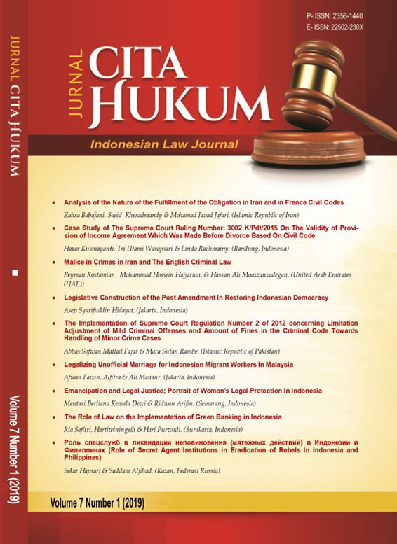Analysis of the Nature of the Fulfillment of the Obligation in Iran and in France Civil Codes
DOI:
https://doi.org/10.15408/jch.v7i1.10716Keywords:
Payment, Compliance with Obligations - Without Appeal Juris Tantum's ConsiderationsAbstract
Abstract
Completion of ambiguity and the provision of accurate legal interpretations requires the examination of various legal opinions. Legal rights regarding ambiguity are contained in Article 265 of the Iranian Civil Code which states that if someone gives property to someone else, it is assumed that he has not done it without consideration. This has been a matter of years of debate between lawyers. Some of them considered the problem as proof that someone who gave property was compulsory, and they believed that the request for expropriation of property must prove that there was no obligation to give and deserve to receive repayment of the property. Others believe in the lack of certainty of the obligations of the giver and require proof of the right to accept the recipient of the property. The findings of this study indicate that what caused the disagreement in the court was due to the Brief Article of the Civil Code of Iran, and a lack of attention to the legislator's ultimate goals in the public interest, and a lack of understanding of the difference between "giving property" and "paying money to others. "Among the legal experts made an interpretation of Article 265 of the Iranian Criminal Code and adapted it to Article 1235 of the French Criminal Code, because this provision does not say that anyone who provides financial assistance to someone is considered that he did not do so without consideration, so he could return it. The result of this deduction is "praduga Juris tantum" which will persuade the judge's conscience.
Keywords: Payment, Compliance with Obligations - Without Appeal Juris Tantum's Considerations
Abstrak:
Penyelesaian ambiguitas dan pemberian interpretasi hukum yang akurat memerlukan pemeriksaan berbagai pendapat hukum. Hak-hak hukum mengenai ambiguitas tertuang dalam Pasal 265 KUH Perdata Iran yang menyatakan bahwa jika seseorang memberikan properti kepada orang lain, maka itu dianggap dia belum melakukannya tanpa pertimbangan. Hal ini telah menjadi masalah perdebatan selama bertahun-tahun antara pengacara. Beberapa dari mereka menganggap masalah tersebut sebagai bukti bahwa seseorang yang memberikan properti wajib, dan adanya permintaan untuk pengambilalihan properti harus terbukti tidak adanya kewajiban untuk memberi dan pantas menerima pembayaran kembali properti itu. Sebagian lain percaya pada kurangnya kepastian kewajiban pemberi dan membutuhkan bukti hak untuk menerima pada penerima properti. Temuan penelitian ini menunjukkan bahwa penyebab perdebatan di pengadilan karena ambiguitas pasal Ringkas pada Kode Sipil Iran, dan kurangnya perhatian terhadap tujuan akhir legislator untuk kepentingan publik, serta kurangnya pemahaman akan perbedaan makna antara "memberi properti" dan "membayar uang kepada yang orang lain." Para ahli hukum melakukan penafsiran terhadap Pasal 265 KUHP Iran dan melakukan adaptasinya dengan Pasal 1235 KUHP Perancis. Hasil dari deduksi ini adalah "praduga juris tantum" yang akan dapat mempengaruhi hati nurani hakim.
Kata kunci: Pembayaran, Pemenuhan Kewajiban Tanpa Banding, Anggapan Juris Tantum
Аннотация:
Кодекс поведения, который предусматривает: «если кто-то передает имущество другому, это считает, что он не сделал это без рассмотрения; ... "и сравнивает его с французским законодательством, которое на протяжении многих лет было предметом спора между юристами. Некоторые из них считают эту статью доказательством того, что лицо, передающее имущество, является обязанным, и считают, что запрос об экспроприации имущества должен доказать, что выкуп имущества не является обязательным, но другие считают, что отсутствие определенности в отношении обязанности дарителя и требование подтверждения принятия для получения на имущество получателя. Исследование показывает, что противоречивые мнения в судах обусловлены: 1- краткой статьей 265 гражданского кодекса ирана. 2. Отсутствие внимания к конечной цели законодателя в общественных интересах. 3. Отсутствие различия между «передачей имущества» и «выплатой денег другому» в уголовном кодексе ирана и его адаптацией к статье 1235 уголовного кодекса франции. Результатом этого является «презумпция juris tantum», которая убедит совесть судьи.
Ключевые Слова: Оплата, Исполнение Обязательства Без Рассмотрения Апелляционно-Презумпционной Юрисдикции
References
A- Books
Aji, A.M; Yunus, N.R. Basic Theory of Law and Justice, Jakarta: Jurisprudence Institute. 2018.
Bojnourdi, S.M. The rules of Jurisprudence, Volume II, Third Edition, Arouj Institute, Tehran.
Emami, S.H. Civil Rights, Vol. 1, Islamiyah, Tehran, 20th Edition. 1999.
Katouzian, N. General Theory of Commitments, Sixth Edition, Mizan Publication. 2002.
Katouzian, N. General Rules of Contracts, Volume Four, Fifth Edition, Publication of Joint Stock Company. 2008.
Langroudi, J.; and Jafar, M. Extensive Understanding of the Rights of Law. Volume II, Second Edition, Ganj Danesh, Tehran. 2002.
Langroudi, J.; and Jafar, M. Extensive Understanding on the Rights of Translators, Vol. 1, Second Edition, Ganj Danesh, Tehran. 2002.
Langroudi, J.; and Jafar, M. Elemental Culture, Tehran: Ganj Danesh. 2003.
Langroudi, J.; and Jafar, M. Terminology of Law, Twenty-Second Edition, Ganj Danesh, Tehran. 2009.
Maggalatung, A.S.; Aji, A.M.; Yunus, N.R. How The Law Works, Jakarta: Jurisprudence Institute, 2014.
Safai, H. Sale International Law, Publishing & Printing Institute of Tehran University. 2005.
Safai, H.; and Rahimi, H. Civil liability (out-of-contract requirements), Fifth Edition, SAMT Publication, Tehran. 2013.
Safai, S.H.. Civic Elementary Course, General Contracts, Second Volume, Seventh Edition, Mizan Publishing, Tehran. 2013.
Senhori, A.R. Extensive Understanding of the Rights of Law, Volume I, Beirut, Institute of Book. 1415.
Shahidi, M. Discharge of Obligations. Eighth Edition, Majd, Tehran. 2010.
B - Articles
Reza, K.K.A. "Is giving money is a proof for the obligation?" The humanities teacher quarterly, the ninth period, No.3, the autumn 2005.
Catala, N. La nature juridque du Payement, Paris. 1961.
Ghasemzadeh, M. "The Mutual Influence of Contracts and Bills and Seizure." Journal of Legal Views, Vol. 9, Spring 1998.
Hassan, R.P. Inescapable Commitment, Master's thesis in Private Law, Tarbiat Modarres University. 1989.
Hossein, A.A. "The nature of the implementation of the contractual obligation," Journal of the Bar Association, vol. 8 and 9.
Javanmardi, N. "The nature of the fulfillment of the obligation and its consequences in the Iran law", Scientific Journal of Law and Politics of Allameh Tabataba'i University, 4th, 3rd, Spring and Summer 2001.
Khoyi, J.M. The essence of the Fulfillment of the Obligation, Ph.D.Thesis, Private Law, University of Tehran, 5th. 1977.
Sadeghi, M. "A Comparative Study and the criticism to the discharge of obligations in Iran Civil Code," No. 56, the year 48, the second period, May. 2005.
Siamak, R.P. "Review of Iranian Civil Law and Civil Law Documents in General Contracts." Journal of the Humanities. Tarbiat Modarres University, Special Issue of Law, Spring 2005.
Islamic Republic of Iran: Civil Code of the Islamic Republic of Iran, the Year 1928.
France Code civil des Français (French Civil Code), 1804.











